人教精通版英语六年级下册第二单元知识点讲解
新人教版小学英语六年级下册各单元重点考点总结
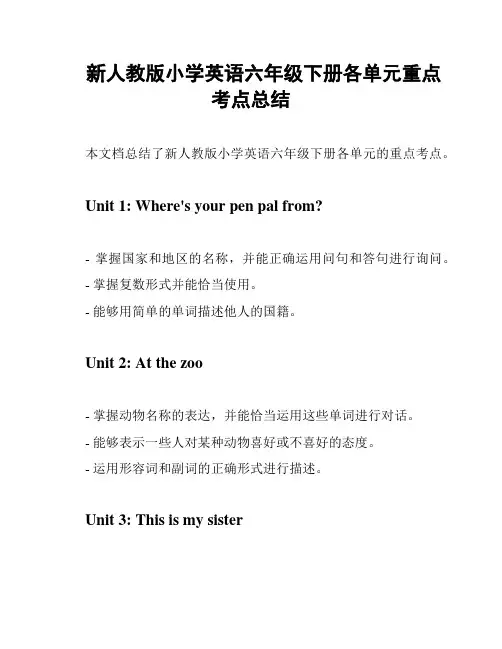
新人教版小学英语六年级下册各单元重点考点总结本文档总结了新人教版小学英语六年级下册各单元的重点考点。
Unit 1: Where's your pen pal from?- 掌握国家和地区的名称,并能正确运用问句和答句进行询问。
- 掌握复数形式并能恰当使用。
- 能够用简单的单词描述他人的国籍。
Unit 2: At the zoo- 掌握动物名称的表达,并能恰当运用这些单词进行对话。
- 能够表示一些人对某种动物喜好或不喜好的态度。
- 运用形容词和副词的正确形式进行描述。
Unit 3: This is my sister- 掌握表示家庭成员关系的词汇,并能在合适的情境下熟练使用。
- 能够用简单的句子表达自己和他人的家庭成员状况。
- 掌握疑问句和肯定/否定回答的语法结构。
Unit 4:What do you usually do on weekend?- 掌握表示日常活动和娱乐爱好的名词和动词,并能在合适的情境下熟练使用。
- 能够描述周末的计划,并能够用适当的时态表达过去、现在和未来的时间。
- 学会以礼貌的方式询问和回答他人的问题。
Unit 5: What's the matter?- 能够描述自己的身体不适,并能运用一些常用的疾病词汇。
- 掌握表示询问、建议和回答的用语,并能在合适的情境下使用。
- 学会表示关心和病愈等祝福的表达方式。
Unit 6: It's raining- 学会用简单的句子描述天气情况,并能表达对不同天气的态度。
- 掌握天气形容词的表达方式。
- 能够描述不同季节的气温、天气和风景。
总之,在学习小学英语六年级下册的过程中,应注重关注以上重点考点,并在实际中多进行运用练习,以此提高英语水平。
人教精通版六下英语第二单元知识点总结
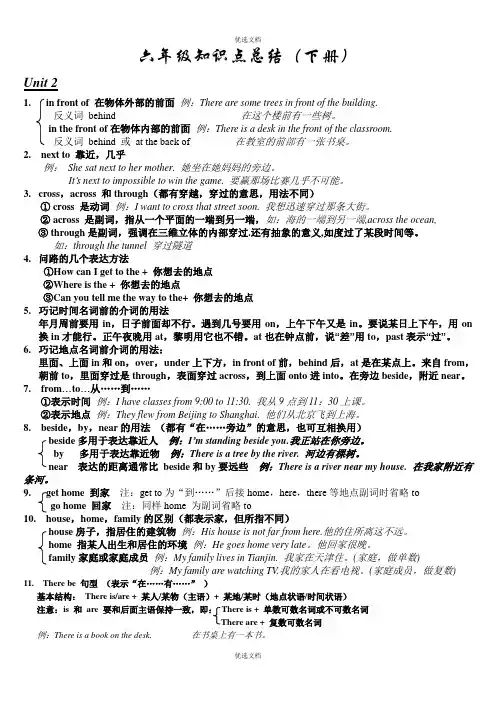
六年级知识点总结(下册)Unit 21. in front of 在物体外部的前面例:There are some trees in front of the building.反义词behind在这个楼前有一些树。
in the front of在物体内部的前面例:There is a desk in the front of the classroom.反义词behind 或at the back of在教室的前部有一张书桌。
2.next to 靠近,几乎例:She sat next to her mother. 她坐在她妈妈的旁边。
It’s next to impossible to win the game. 要赢那场比赛几乎不可能。
3.cross,across 和through(都有穿越,穿过的意思,用法不同)① cross 是动词例:I want to cross that street soon. 我想迅速穿过那条大街。
② across 是副词,指从一个平面的一端到另一端,如:海的一端到另一端,across the ocean,③ through是副词,强调在三维立体的内部穿过.还有抽象的意义,如度过了某段时间等。
如:through the tunnel 穿过隧道4.问路的几个表达方法①How can I get to the + 你想去的地点②Where is the + 你想去的地点③Can you tell me the way to the+ 你想去的地点5.巧记时间名词前的介词的用法年月周前要用in,日子前面却不行。
遇到几号要用on,上午下午又是in。
要说某日上下午,用on 换in才能行。
正午夜晚用at,黎明用它也不错。
at也在钟点前,说“差”用to,past表示“过”。
6.巧记地点名词前介词的用法:里面、上面in和on,over,under上下方,in front of前,behind后,at是在某点上。
2024六年级英语下册Unit2单元知识必备清单课件人教精通版三起
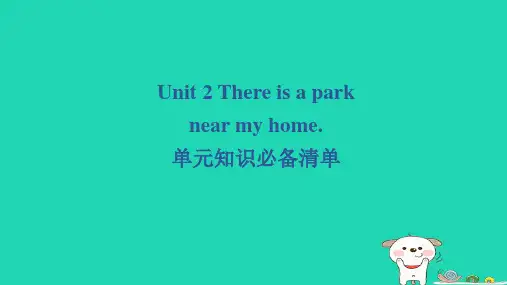
解读: 问句是由how 引导的特殊疑问句,用于询问出行方式, 答语中的“by +交通工具” 也可用“take +the/a +交通 工具”的形式表达。
句型结构: —How can I get to +某地? —You can get to +某地+by +交通工具. / You can take the/a +交通工具+to +某地.
解读: 该句是由where 引导的用于询问地点的特殊疑问句。 句型结构: Where is/are +地点?
3 —How can I get to the City Library? 我怎样才能到达城市图书馆?
—You can get there by No. 6 bus. 你可以乘坐6 路公共汽车到那里。
live in 居住在 in front of 在……前面 between a hotel and a bookshop 在旅馆和书店之间 by bike/bus 骑自行车/乘坐公共汽车 on my way to school 在我上学的路上 go down this street 顺着这条街走
重点句型
4 How long does it take to go there? 你去那里花费多长时间?
解读: 该句是由how long Байду номын сангаас导的特殊疑问句,用于询问出行 所花费的时间。
句型结构: How long does it take to go to +某地 ?
Unit 2 There is a park near my home.
单元知识必备清单
重点单词
Unit 2
人教版英语六年级下册第二单元知识点归纳总结复习
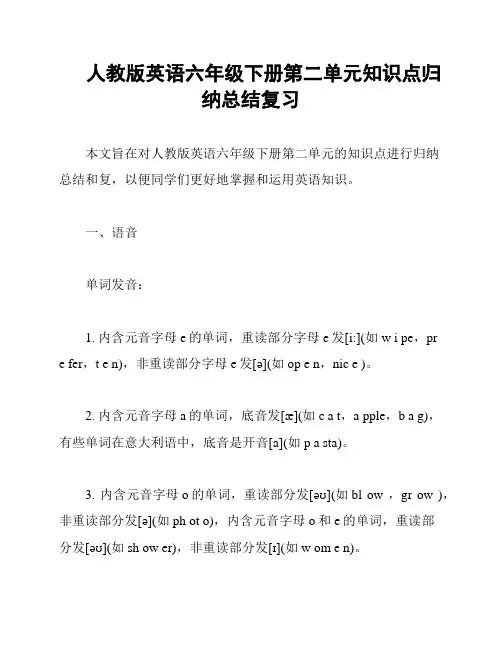
人教版英语六年级下册第二单元知识点归纳总结复习本文旨在对人教版英语六年级下册第二单元的知识点进行归纳总结和复,以便同学们更好地掌握和运用英语知识。
一、语音单词发音:1. 内含元音字母e的单词,重读部分字母e发[i:](如w i pe,pre fer,t e n),非重读部分字母e发[ə](如op e n,nic e )。
2. 内含元音字母a的单词,底音发[æ](如c a t,a pple,b a g),有些单词在意大利语中,底音是开音[a](如p a sta)。
3. 内含元音字母o的单词,重读部分发[əʊ](如bl ow ,gr ow ),非重读部分发[ə](如ph ot o),内含元音字母o和e的单词,重读部分发[əʊ](如sh ow er),非重读部分发[ɪ](如w om e n)。
4. 指在a, o, u三个元音字母后的r的发音,在美式英语中基本不发音,而在英式英语中喜欢将发音弱化,只用[r]表示(如st a r,b o th,p u rple)。
二、语法1. 本单元主要研究there be句型, 即“有”句型。
构成方式为:there + be动词(am, is, are)+ 名词或代词。
2. 动词的第三人称单数的构成方式:一般情况下在动词后直接加s。
但以下几类动词除外:(1)以s, x, ch, sh结尾的动词,直接加es(如watch → watches,fix → fixes,pass → passes,brush → brushes)。
(2)以辅音字母+y结尾的动词,改y为i再加es(如carry → carries,study → studies)。
(3)以o结尾的动词,有的在词尾直接加s(如go → goes),有的加es(如do → does),还有的变成es(如potato → potatoes)。
三、词汇2. 这些单词需要同学们反复背诵和使用,以便记忆更加深刻。
(完整版)人教版六年级英语下册Unit2知识点汇总
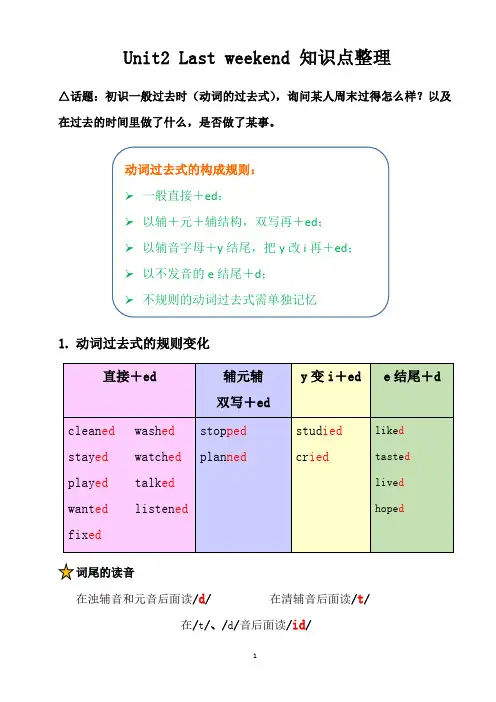
Unit2 Last weekend 知识点整理△话题:初识一般过去时(动词的过去式),询问某人周末过得怎么样?以及在过去的时间里做了什么,是否做了某事。
1.动词过去式的规则变化词尾的读音在浊辅音和元音后面读/d/ 在清辅音后面读/t/在/t/、/d/音后面读/id/2.不规则动词过去式do/does did am/is was are were have/has had see saw drink drank go went sleep slept make made get got read read3.动词短语cleaned my room washed my clothes stayed at home watched TV did my homework drank tea(喝茶) read a book saw a film(看电影) had a cold(感冒) went boating(划船) listened to music made the bed(整理床铺) 4.时间短语last night(昨晚)last Monday(上周一) last weekend(上个周末) yesterday(昨天) the day before yesterday(前天)△句型:①询问对方周末过得怎么样How was your weekend?—— It was fine/good/great,thank you.②询问某人在过去的时间里做了什么What did+主语+do(+过去时间)?——主语+动词过去式+其他。
例句:What did you do last weekend?—— I stay ed at home and watch ed TV.③询问对方在过去的时间里是否做了某事Did +主语+动词原形+其他?—— Yes,主语 did. / No, 主语 didn’t.例句:Did he have a cold yesterday?—— Yes,he did. / No,he didn’t.Did you see a film (last night)?—— Yes,I did. / No,I didn’t.④询问电影是否有趣Was it interesting?—— Yes,it was. / No, it wasn’t.△知识点:1:否定(缩写)形式:直接+not did didn’twas wasn’t were weren’t2:想要做某事:want + to +动词原形3:than+动词ing 例:It’s faster than walking.4:enjoy(享受)+动词ing I enjoy playing computer games. 5: too 用于肯定句either 用于否定句6: 句型的转换①He read a book yesterday afternoon.(对划线部分提问)What did he do yesterday afternoon ?②I washed my clothes last morning.(改为一般疑问句)Did you wash your clothes last morning?也③I went shopping last night. (改为否定句)I didn’t go shopping last weekend.④Did you do your homework last night. (否定回答)No,I didn’t.⑤My weekend was bad . (就划线部分提问)How was your weekend ?易错题❖ She usually clean s her room on the weekend.❖ She clean ed her room last weekend.❖ I like watch ing TV. I watch ed TV yesterday.❖ I am going to see a film next Friday. I saw a film last Friday. ❖ We didn’t go boating the day before yesterday.。
人教精通英语六下U2知识点
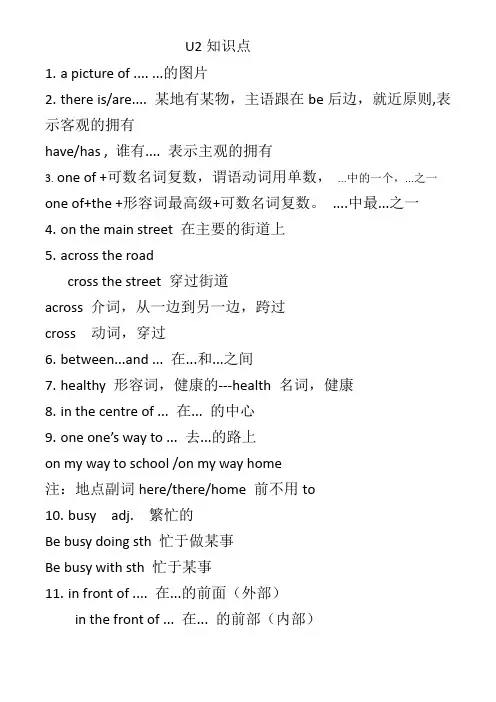
1.a picture of .... ...的图片2.there is/are.... 某地有某物,主语跟在be后边,就近原则,表示客观的拥有have/has , 谁有.... 表示主观的拥有3.one of +可数名词复数,谓语动词用单数,...中的一个,...之一one of+the +形容词最高级+可数名词复数。
....中最...之一4.on the main street 在主要的街道上5.across the roadcross the street 穿过街道across 介词,从一边到另一边,跨过cross 动词,穿过6.between...and ... 在...和...之间7.healthy 形容词,健康的---health 名词,健康8.in the centre of ... 在... 的中心9.one one’s way to ... 去...的路上on my way to school /on my way home注:地点副词here/there/home 前不用to10.busy adj. 繁忙的Be busy doing sth 忙于做某事Be busy with sth 忙于某事11.in front of .... 在...的前面(外部)in the front of ... 在... 的前部(内部)12.Nice/glad/pleased to meet you. 见到你很高兴13.move to 搬到....14.it takes sb +时间+ to do sth 花费时间做某事sb spend 时间/金钱(in)doing sth 花时间/金钱做某事sb spend 时间/金钱on sth 在... 上花费时间/金钱15.--- Thank you! --- My please.---Thanks a lot! ---- You are welcome.16.No.=number 数字,好吗17.be far from... 离... 远18.over there 那边19.乘坐交通的表达方式:(冠词也可是形物代)●by +交通工具●take +冠词+交通工具●动词(ride,walk,drive,fly)●On +冠词+可以站起来的交通工会,in+冠词+站不起来的交通工具●on foot 步行20.get off 下车---get on 上车21.at the third stop在第三个公交站bus stop=bus station 公交站22.hear sb doing sth 听见某人正在做某事23.want sb to do sth =would like to do sth24.tell sb the way 给某人指路25.go straight 直行26.in the world 在世界上around the world 世界各地27.enjoy doing sth;enjoy oneself=have a good time =have fun28.take ... to ....带...去...29.run about 四处走30.play chess 下棋31.play card games 打牌32.practise doing sth 练习做某事33.be happy to do sth 高兴做某事34.famous 著名的be famous for... 因...而著名,be famous as ... 作为... 而著名35.单词积累:quiet 安静的,nature 自然,jog 慢跑,roller-skate 滑旱冰,skateboard 滑滑板,foreign 外国的,carriage 四轮马车,miss 错过,special 特殊的,brush 刷子,sweetly 甜美的,悦耳的。
新人教精通版六年级英语下册:Unit 2 There is a park near my home
Is there any water in the glass ?
There be 就数量提问:
How many + 名词复数+ are there + 介词短语?
How much +不可数名词+ is there +介词短语
Eg: There are three birds in the tree. Answer: How many birds are there in the tree? Eg:There is little water in the bottle. Answer: How much water is there in the bottle ?
5. There are fifty students in my class.(对划线部分提问) __H__o_w_ _m_a_n_y__ students are there in your class?
There be 就名词提问:
What’s + 介词短语?
Eg: There is a book on the desk. Answer: What’s on the desk? Eg: There are two trees beside the
图片里有一个女孩,两个男孩。 Eg: There is a girl and two boys in the picture.
图片里有两个男孩,一个女孩。 Eg: There are two boys and a girl in the picture.
1.There _is___ a pen near the ruler.
人教版六年级下unit 2知识点总结
Unit 2 Last weekend.知识点总结一必背单词cleaned( clean的过去式)打扫stayed(stay的过去式)停留washed(wash的过去式)洗watched( watch的过去式)看had(have的过去式)患病;得病slept(sleep的过去式)睡觉read(read的过去式)读saw(see的过去式)看见last最近的;上一个的yesterday昨天before在…之前had a cold感冒二必背词组动词短语talked about谈论(过去式) stayed at home待在家里(过去式) drank tea 喝茶(过去式)watched TV看电视(过去式) watched some children`s shows看一些儿童节目(过去式)did something else做其他事情(过去式)cleaned my room打扫房间(过去式) washed clothes洗衣服(过去式) read a new film magazine 看一部新的电影杂质(过去式)buy the new film magazine 买新一期的电影杂质had a cold 感冒(过去式)cooked the food 烹饪食物(过去式) read a book 读书(过去式)did my homework做家庭作业(过去式went fishing去钓鱼(过去式) played football 踢足球(过去式) saw a film看电影(过去式)时间短语last weekend上周末Last night昨晚all weekend整个周末all night整晚the day before yesterday 前天on Saturday morning / afternoon 在星期六上午/下午三重点句型1.How was….用来询间对方过去的某个时过得如何句式结构:How+was+时间名词(短语)?回答:主语+was+形容词。
六年级下英语知识点归纳Unit2What’sthematterMike_人教PEP
Unit 2 What’s the matter, Mike?必背词汇:have a fever (发烧)tired (疲劳的)have a cold (感冒)excited(兴奋得)have a sore throat (喉咙痛)angry(生气的)表示身体have a toothache (牙痛)表示情绪sad (悲伤的)不适的have a headache (头痛)心情happy (高兴得)hurt (疼痛)bored (无聊的)sore (疼得)其他:feel(感觉)sick(有病的)nose(鼻子)know(知道)worry (担心)medicine (药)drink (喝)stay (在,逗留)better(更好的)soon (立刻,不久)trip (旅行)fail (失败)pass(传递)重点句型:1.A:What’s the matter? 你怎么啦?B: I have a toothache. 我牙痛。
2.A: How do you feel ? 你感觉怎样?B:I feel sick. 我觉得不舒服。
3.A:How does she/he feel? 她/他感觉如何?B:She/ He is tired. 她/他累了。
4.You look so happy. 你看起来如此高兴。
5.A:I failed the math test. 我数学考试失败了。
B:I’m sorry to hear that. 听到这个消息我很难过。
6.How are you ? You look so excited. 你怎么了?你看起来很兴奋。
7.If you have a fever ,you might have athe flu.如果你发烧,你可能得了流感。
8.Don’t worry! If you are sick,see the doctor.不要担心!如果你病了,去看医生。
9.Take some medicine and drink hot drinks.吃些药和热饮料。
六年级下册英语第二单元知识点
六年级下册英语第二单元知识点一、核心词汇1.动词短语类:cleaned my room 打扫房间washed my clothes洗衣服stayed at home待在家里watched TV看电视read a book读书saw a film看电影had a cold感冒2.时间短语类:last weekend上周末yesterday昨天last night昨天晚上last Monday上个星期一the day before yesterday前天二、了解词汇drank喝show演出better更好的faster更快的fixed修理broken破损的anything else其他的事情三、核心句型1.How was your weekend?你周末过得怎么样?2.—What did you do last weekend?上周末你干什么了? —I played football.我踢足球了。
解读: What did + 主语+ do + 过去时间?用来询问他人过去某一时间做了什么事情。
回答用“主语+ 动词过去式+ 其他.”。
3.—Did you read books?你读书了吗?—Yes, I did./No, I didn’t.是的,我读了。
/不,我没读。
解读: Did + 主语+ 动词原形+ 其他?用来确定他人过去某个时间是否做了某事。
回答用“Yes, 主语+ did./No, 主语+ didn’t.”。
四、了解句型I stayed at home with your grandma. 我和你奶奶待在家里。
解读: with在这里指“和……一起”。
- 1、下载文档前请自行甄别文档内容的完整性,平台不提供额外的编辑、内容补充、找答案等附加服务。
- 2、"仅部分预览"的文档,不可在线预览部分如存在完整性等问题,可反馈申请退款(可完整预览的文档不适用该条件!)。
- 3、如文档侵犯您的权益,请联系客服反馈,我们会尽快为您处理(人工客服工作时间:9:00-18:30)。
Unit There is a park near my home.
一、核心词汇
1.名词
river河流vegetable蔬菜street大街;街道minute分钟;一会儿city城市
library图书馆
2.表示方位的介词
near在……附近beside在……旁边between在……中间
3.短语
healthy(food)健康的(食品)turn right/left右转/左转
on the right/left在右边/左边half an hour半小时
二、了解词汇
1.名词
bank银行bookshop书店hotel宾馆supermarket超市hospital医院restaurant饭店
2.方位介词
behind在……后面
3.短语
In front of在……前面clothes shop服装店across the road在马路对面go down this street顺着这条街走
turn right at the traffic lights交通灯处右转
cross the street穿过马路City Library城市图书馆post office邮局by bike骑自行车by subway乘地铁on foot步行
三、核心句型
1.There is a park near my home and there is a river behind the park.在我家附近有一个公园,在公园后面有一条河。
解读:这是there be句型的固定结构。
句型结构为There be+名词+介词+名词.
举一反三:There is a bank behind my home.
在我家后面有一个银行。
There are some books on the desk.
桌子上有一些书。
2.There are a lot of trees and flowers in the park.
在公园里有许多树和鲜花。
解读:there be表示某地有某物,be动词的形式要跟后面的主语保持一致,如果后面的主语有两个,则be动词的形式要与离其最近的一
个主语保持一致(就近原则)。
举一反三:There are three people in my family.我家有三口人。
There is some juice and some apples on the table.
桌子上有一些果汁和一些苹果。
There are some apples and some juice on the table.
桌子上有一些苹果和一些果汁。
3.—Where is the bookshop?书店在哪里?
—Go down the street.The bookshop is on the left.顺着这条街走。
书店就在左边。
解读:where是特殊疑问词,提问在哪里。
godown是顺着的意
思,on the left是在左边,注意“在左边”,“在右边”用介词on,在星期几也用介词on,在具体的某一天的上午、下午、晚上,也用介词on。
举一反三:—Where is the park?公园在哪里?
—It’s on the right.它在右边。
4.—How can I get to the City Library?我怎样去城市图书馆?
—You can go there by No.6 bus.你可以乘6路公共汽车去那里。
解读:how是特殊疑问词,提问方式,get to是到达的意思。
举一反三:—How can she get to school?她怎样去上学?
—On foot.步行。
四、了解句型
1.Across the road,there is a big supermarket between a hotel and a bookshop.
在马路对面,宾馆和书店的中间有一个很大的超市。
解读:between A and B是固定结构。
A和B均为名词。
表示在A 和B两个事物之间。
3.I moved to this community last week.
4.我上个星期搬到了这个社区。
解读:moved是move的过去式,move to表示搬到某个地方。
3.I live in this community!我在这个社区居住。
解读:live in表示在某地居住。
live in+大地方,live at+小地方。
4.Where are you going?你要去哪里?
解读:本句是现在进行时表示一般将来时,当句子中用动词“come,go,arrive,leave”等词时,用现在进行时表示一般将来时。
5.Go down this street.顺着这条街走。
解读:本句是祈使句,表示命令、请求、劝告等语气,直接以动词原形开头。
